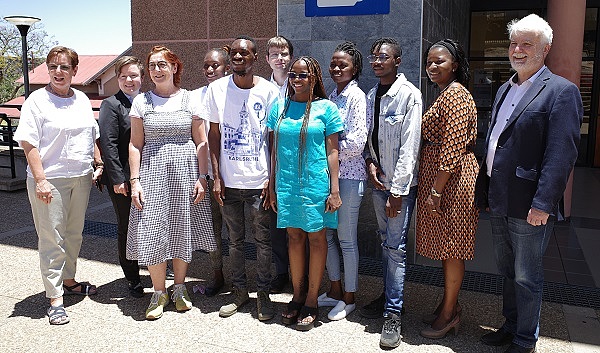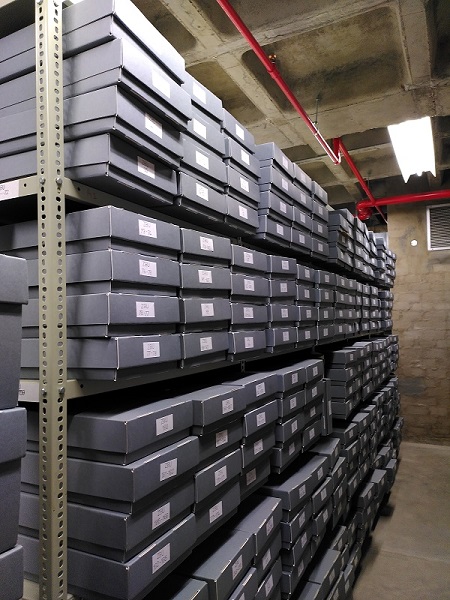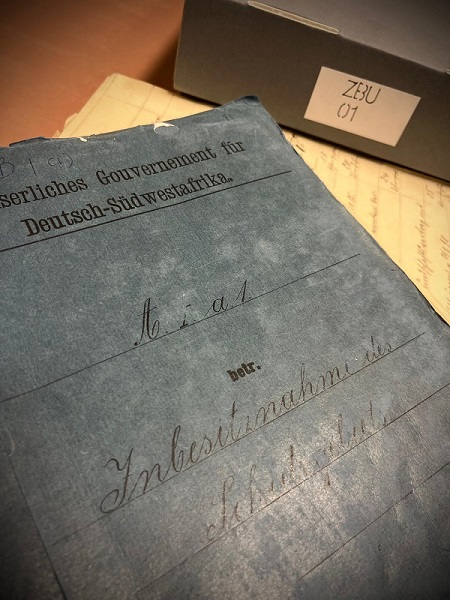Preserving and Making Accessible Sources from the German Colonial Era in Namibia

Confronting the colonial heritage is a task for German society as a whole. The State Archives of Baden-Württemberg (Landesarchiv Baden-Württemberg) commits itself to this important responsibility. Since 2019, it has been working together with the National Archives of Namibia to preserve documents from the German colonial period in Namibia (1884–1915) and to make them accessible to a broad public.
The cooperation between the State Archives of Baden-Württemberg and the National Archives of Namibia is part of the "Namibia-Initiative" of the State of Baden-Württemberg, which began with the preparations for the return of important personal artefacts belonging to the Namibian resistance fighter and kaptein Hendrik Witbooi (c. 1830–1905). His family Bible and whip, which had been held at the Linden Museum, Stuttgart, since 1902, were only repatriated to the Republic of Namibia in 2019. The then Minister of Science, Theresia Bauer, gave the artefacts back to Namibia’s late President Dr Hage Geingob (1941–2024) in a ceremonial act organized together with the Witbooi family in Gibeon, Namibia. The State of Baden-Württemberg took this as an opportunity to launch a multi-year initiative organised by the Ministry of Science, Research and the Arts (Ministerium für Wissenschaft, Forschung und Kunst), in which several cultural and scientific institutions, including the State Archives of Baden-Württemberg, participated.
Phase I: Restoration and conservation (2021–2023)

The project’s aim during the first funding phase was to organise archival solutions for the permanent preservation of the extensive records from imperial authorities in colonial German South West Africa. These records were left behind in Windhoek after the defeat of the German Empire during the First World War. The material stored at the National Archives of Namibia is the largest German colonial archive outside the Federal Republic of Germany. It comprises around 8,000 indexing units, the provenances of which are primarily the central offices, such as the Imperial Central Office (Zentralbüro), as well as the district offices (Bezirksämter) and courts of the colonial regime. The State Archives of Baden-Württemberg shipped several thousand archival boxes to Windhoek for packing these documents. In addition, it set up a restoration centre at the National Archives of Namibia and provided training for staff, so that the Namibian archivists can preserve and conserve their analogue documents. The new centre is one of a few of its kind in southern Africa. Cornelia Bandow, Andrea Rendler (both Institut für Erhaltung) and Bettina Heck (Generallandesarchiv Karlsruhe) provided the expertise on the part of the State Archives of Baden-Württemberg, with overall responsibility taken by Dr Nicole Bickhoff (Hauptstaatsarchiv Stuttgart) and Prof. Dr Wolfgang Zimmermann (Generallandesarchiv Karlsruhe).
Phase II: Conservation and accessibility (2024–2026)
Thanks to the continuation of the Namibia-Initiative, the State Archives of Baden-Württemberg launched the second phase of the project in 2024. While the first phase focused primarily on conservation measures, the project now pursues two paths: firstly, the State Archives of Baden-Württemberg, in the persons of Cornelia Bandow, Bettina Heck and Andrea Rendler, will continue to provide further support with the packing of records and training in conservation and preservation. Secondly, the German-language finding aids for the colonial records will be translated into English and non-preferred terms removed from the catalogue descriptions. Since English cataloguing information of the German colonial collections do not exist, it is extremely important to make these records accessible to the wider public through a translation. The current finding aids were created during the South African occupation and mandate period in Namibia (1915–1990). As the titles on the German records provided the basis for the cataloguing at that time, the finding aids contain numerous outdated, derogatory and sometimes racist terms, which will be removed in the course of the translation. This important step is being carried out in close consultation with the National Archives of Namibia and other partners such as the Museums Association of Namibia (MAN) and the University of Namibia (UNAM).

In addition, the State Archives of Baden-Württemberg will support the National Archives of Namibia with the migration of its electronic cataloguing data from the now outdated CDS/ISIS software to the globally used archive information system AtoM. This means that not only can the cataloguing information on all holdings be managed and enriched, but it can also be linked to digitised material and presented online. The introduction of AtoM, which complies with international standards, would make the National Archives of Namibia more visible worldwide. NAN’s rich holdings would be accessible to researchers global, and most importantly, in combination with the English-language finding aids, Namibians would be empowered to engage with their country’s past while, at the same time, Germans would be enabled to confront their colonial heritage. This second phase will be undertaken by a German-Namibian cooperation. The State Archives of Baden-Württemberg is represented by Dr Stefan Holz (Hauptstaatsarchiv Stuttgart) and Dr Jennifer Meyer (Archivischer Grundsatz) under the direction of Prof. Dr Wolfgang Zimmermann. Ms Sarah Negumbo (Director for Namibia Library and Archives Service at the Ministry of Education, Arts and Culture), Ms Namutenya Hamwaalwa (Deputy Director) and Mr Ndamian Hangula (Chief Archivist of NAN) lead the Namibian team.
The project brings Germany and Namibia closer together by deepening the ties between two major archival institutions and by sharing expertise, experience and knowledge, especially regarding how to deal with the challenges of digitisation, conservation and accessibility. It makes a significant contribution to intensifying engagement with the colonial legacy and for moving forward in a cooperative and mutually beneficial way.
